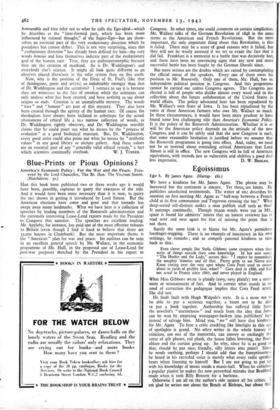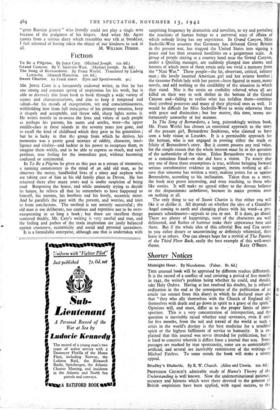Egoissimus
Ego 5. By James Agate. (Harrap. as.) WE have a kindness for Mr. James Agate. The phrase may be borrowed but the sentiment is sincere. Yet there, are limits. He publishes unsolicited testimonials. The writer of one describes his emotion on first meeting Mr. Agate as " half-way between a French child at its first communion and Tennyson crossing the bar." What deep-seated self-distrust makes a man publish stuff such as that? It outcrops continually. Though 70,000 words were -cut in MS., space is found for admirers' letters that an honest reviewer has to read over and over again for fear of missing the point that is not there.
Surely the same kink is to blame for Mr. Agate's pernickety forefinger-wagging. There is no example of inaccuracy in his own writings, he remarks ; and so compels paternal kindness to turn back to this :
Even clever people like Stella Gibbons come croppers when they write of things outside their own knowledge. In her new story, " The Hoofer and the Lady," occurs this: I expect he remembers the naughty 'nineties and all that. Pretty grim to see Nervo and Knox rioting over the very spot where Cora Pearl used to swoon about in yards of grubby lace, what? " Cora died in 1886, and had not acted in France since 1867, and never played in England.
What Miss Gibbons wrote is plainly (very,-very plainly) not a state- ment or misstatement of fact. And to correct what stands in no need of correction the pedagogue implies that Cora Pearl acted. She did not.
He finds fault with Hugh Walpole's style. ,It is a mote not to be able to put a sentence together, a beam not to be able to put a book together. Authorship has suffered little from the novelist's " unexactness " and much from the idea that fame can be won by emptying wastepaper-baskets into publishers' laps instead of salvage bins. Mind you, " we " still have that kindness for Mr. Agate. To hear a critic crackling like limelight in this age of spotlights is grand. No other writer in the whole history of criticism, not one of the immortals, can convey so excitingly the sense of gilt plaster, red plush, the house lights lowering, the floats ablaze and the curtain going up. So why, since he is as good as that, should he put nice, friendly, silly letters into print? Since he needs soothing, perhaps I should add that the bumptiousness he heard in his recorded voice is merely what every radio speaker hears when listening to himself. But I am not going to put up with his knowledge of music inside a music-hall. When he criticises a popular pianist he makes the now proverbial mistake that Bradford made when it took Billy Bennett for a baritone.
Otherwise I am all on the author's side against all his critics. I am glad he writes not about the Bench of Bishops, but about that
" great Russian pianist " who literally could not play a single note because of the podginess of his fingers. And when Mr. Agate quotes from a serious diary . which resembles war talk at breakfast, I feel ashamed of having taken the object of our kindness to task at



























 Previous page
Previous page